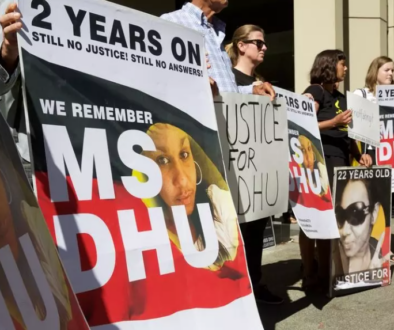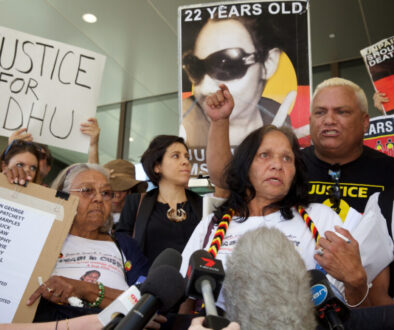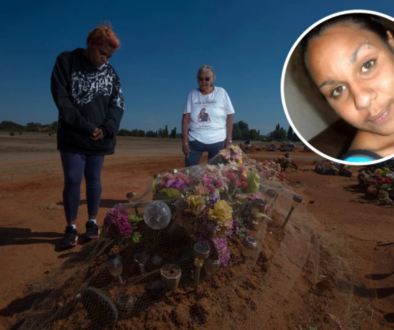Police thought dying Aboriginal woman Ms Dhu was faking it, coronial inquest told
Western Australian police told hospital staff they thought an Aboriginal woman who later died in custody was “faking it”, a coronial inquest has heard.
Ms Dhu, 22, died in August last year after being held at the South Hedland police station in WA’s Pilbara region for unpaid fines totalling $3,622.
She was taken to the Hedland Health Campus three times during her detention after saying she felt unwell.
She died on her third visit.
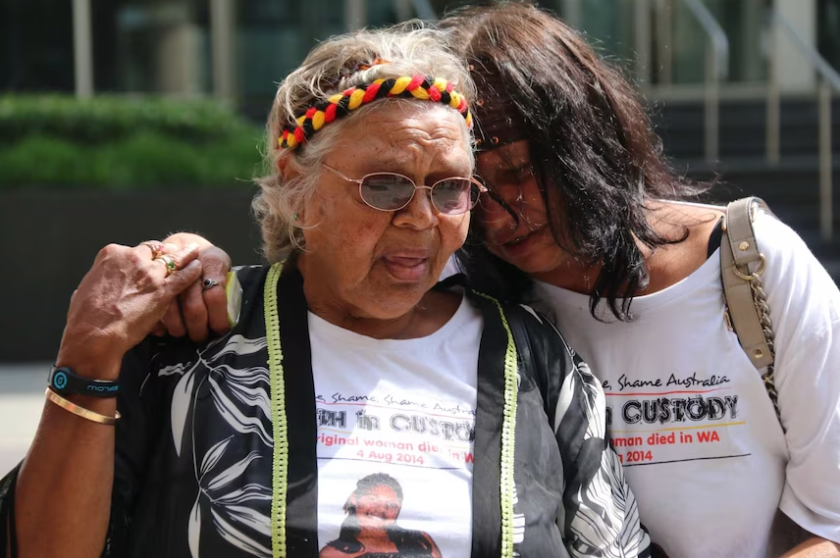
During the opening address, counsel assisting the coroner Ilona O’Brien said Ms Dhu was diagnosed by doctors during the first two visits as having “behavioural issues” and was discharged back into police custody.
Ms O’Brien said unbeknown to the people caring for her, by her second visit Ms Dhu was in the process of dying from septicaemia and pneumonia.
“By the morning of 4 August, 2014, Ms Dhu’s clinical state rapidly worsened, and although it was not appreciated by the police officers involved, some of whom believed that Ms Dhu was feigning her illness, she was in an advanced state of septic shock and only hours from death,” Ms O’Brien said.
Police felt return to hospital ‘not urgent’
On the morning of her death, Ms Dhu was recorded on CCTV footage vomiting in the jail cell and falling backwards and hitting her head on concrete floor.
These events were not witnessed by police.
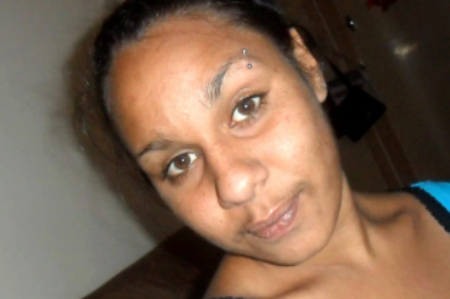
Ms Dhu complained numerous times and told police her hands were going blue and she could not feel her legs.
Police made the decision to take Ms Dhu back to the Hedland health campus but “felt the transfer was not urgent” by an officer identified as shift supervisor Sergeant Rick Bond.
At that time Sergeant Bond made an entry into the custody system that Ms Dhu “appears to be suffering withdrawals from drug use and is not coping well with being in custody”.
The court heard police handcuffed Ms Dhu and took her to the health campus where she “immediately went limp, slumped into the chair and her head and eyes rolled back”.
According to the opening address, nurse Caroline Jones recalled that police officers told them Ms Dhu “was faking it” shortly before she went to cardiac arrest and died.
Woman carried like ‘a dead kangaroo’
The court was shown footage of the three times Ms Dhu was taken to hospital.
The first two times she walks to the police car, but on the day of her last admission, she appears barely conscious.
There were gasps of horror from friends and family in the court as a police officer is seen attempting to lift Ms Dhu’s body from the bed in her cell.
She falls back limply.
She is later dragged from the bed and along the floor out of her cell.
These emotions I go through is like a temperature gauge, the pressure is so high and I don’t know where I should stand.
She is carried to a police Land Cruiser by her arms and legs by Senior Constable Shelly Burgess and Constable Christopher Matier, and loaded alone into the back.
After the door is closed, she moans.
“Oh shut up,” the tape records a male police officer saying.
She is lifted, seemingly unconscious into a wheelchair from the police car at the hospital, and wheeled inside.
During the video, one member of the court’s public gallery remarks: “[She’s being carried] like a dead kangaroo.
“Like South Africa. Oh God.”
Senior Counsel Peter Quinlan, representing Ms Dhu’s family, has questioned exactly when Ms Dhu died, with footage showing her unresponsive in the wheelchair used to take her from the police Land Cruiser into hospital.
Police statements indicate Ms Dhu was conscious during the third trip, and became limp once they arrived and then went into a cardiac arrest.
Ms Dhu was domestic violence victim: family
Ms Dhu’s family told the inquest she was a victim of domestic violence who should have been protected, rather than arrested and left to die.
Ms Dhu’s mother Della Roe, father Robert Dhu and grandmother Carol Roe all testified she was a domestic violence victim and had broken her ribs in the weeks before she was arrested.
Mr Dhu said he advised his daughter to report the violence to police when she told him she had three broken ribs.
“Dad, my man throbs me, he broke my ribs,” Mr Dhu recalled her telling him.
If they [police] had let me talk to her I could have recognised in her voice she was in pain.
An autopsy found Ms Dhu’s death was partly caused by complications from a previous rib fracture.
Mr Dhu told the court nobody from the WA Health Department or the WA Country Health Service has explained to him why his daughter was sent back to the lock-up when she was so ill.
“They shouldn’t have treated anyone like that, they left her there like a dog, to die,” he said.
Carol Roe told the court she rang the lock-up twice, concerned for Ms Dhu but police would not let her speak to her.
“It’s devastating how she died,” she said.
“If they [police] had let me talk to her I could have recognised in her voice she was in pain.
“It hurts so much, my heart is torn out. All this interrogation … pay your respects to the dead.”
The inquest, set down for two weeks, will hear from 10 police officers involved in Ms Dhu’s incarceration, all the medical staff involved in her care and the WA country health service.
Before the hearing began this morning outside court, Ms Dhu’s mother said the circumstances surrounding her daughter’s death remained a mystery and she needed answers.
“These emotions I go through is like a temperature gauge, the pressure is so high and I don’t know where I should stand,” she said.
“The hardest the thing is I am fighting the Government, my family, my friends, and most of all my loving family while riding this emotional roller-coaster and hurting them with this crazy, angry feeling that I have at this moment.”
Royal commission recommendations ‘ignored’
Ms Roe said her daughter’s death had left her struggling with depression.
“Some days I don’t want to do this, but I know if I do anything stupid I won’t get justice for my daughter,” she said.
“I want answers for myself, my family and for friends that knew my daughter.”
Lawyer George Newhouse is representing the WA Deaths in Custody Watch Committee at the coronial inquiry.
He also spoke outside the court and said recommendations of the Royal Commission into Aboriginal Deaths in Custody had been ignored.
“Now those recommendations were made over 25 years ago, and if they had been implemented in WA it’s quite likely Ms Dhu would not have passed away,” he said.
The inquest has been set down for two weeks.
Contact us
Please provide a brief description of your claim.

